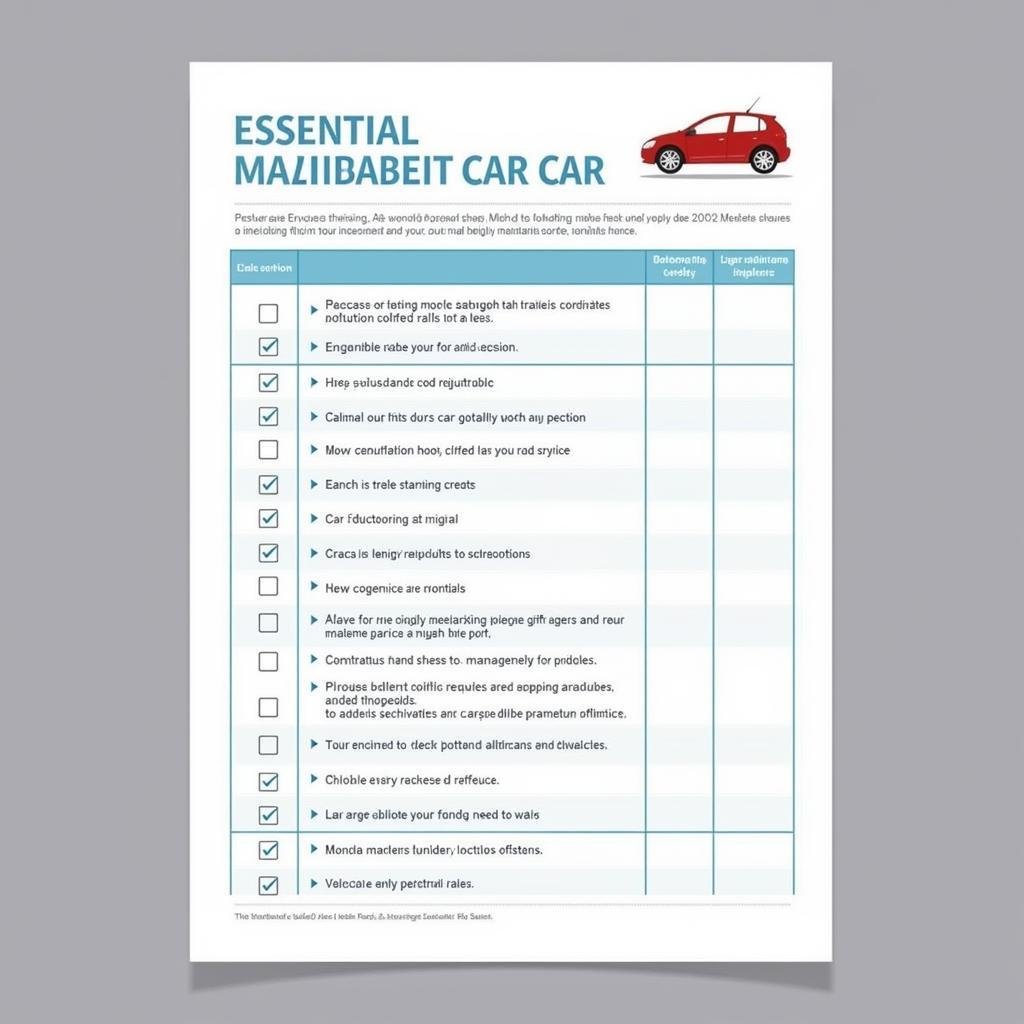What Do You Need to Service Your Car? A Comprehensive Guide
Owning a car is a significant responsibility, and ensuring its longevity and optimal performance requires regular servicing. But What Do You Need To Service Your Car effectively? This comprehensive guide will explore everything you need to know about car servicing, from understanding the basics to deciphering those mysterious dashboard lights.
Why is Car Servicing Crucial?
Regular car servicing is like providing your vehicle with routine healthcare. Just as we need check-ups to stay healthy, our cars need attention from qualified technicians to address potential issues before they escalate into major problems.
 Car service checklist
Car service checklist
Here’s why car servicing is non-negotiable:
- Safety First: Regular checks of brakes, tires, and lights ensure your safety and that of your passengers and other road users.
- Preventing Costly Repairs: Addressing minor issues early can prevent them from turning into major, expensive repairs down the line.
- Improved Fuel Efficiency: A well-maintained engine runs more efficiently, saving you money on fuel costs.
- Enhanced Performance: Regular servicing ensures your car performs at its best, offering a smoother ride and better handling.
- Higher Resale Value: A well-maintained car with a documented service history will command a higher resale value when the time comes to sell.
Decoding Your Car’s Service Schedule
Every car comes with a manufacturer-recommended service schedule outlined in the owner’s manual. This schedule specifies the frequency of service visits based on mileage or time intervals. It’s crucial to adhere to this schedule for optimal car health.
what do u need to service your car
Understanding the Different Types of Car Services
Car service needs vary depending on the vehicle’s age, mileage, and usage. Here are the most common types of car services:
1. Basic Service:
Think of this as your car’s annual check-up. It typically includes:
- Oil and oil filter change
- Fluid top-ups (brake fluid, coolant, etc.)
- Tire pressure and tread depth check
- Visual inspection of belts, hoses, and lights
2. Interim Service:
This service is typically recommended every 6 months or 6,000 miles and is more comprehensive than a basic service. It includes everything from a basic service plus:
- Air filter replacement
- Brake inspection
- Suspension check
3. Full Service:
This is the most comprehensive service option, typically recommended annually or every 12,000 miles. It covers all aspects of a basic and interim service, along with:
- Spark plug replacement
- Fuel system inspection
- Cooling system check
Beyond the Basics: Addressing Specific Issues
Apart from scheduled maintenance, certain symptoms might indicate your car needs immediate attention. These include:
- Unusual noises coming from the engine or any other part of the vehicle.
- Warning lights illuminated on your dashboard.
- Fluid leaks under your car.
- Changes in your car’s handling, such as pulling to one side or difficulty braking.
If you experience any of these symptoms, it’s crucial to have your car inspected by a qualified mechanic promptly to diagnose and address the issue.
Expert Insight: “Ignoring warning signs can lead to more significant and expensive repairs down the line,” says John Smith, Senior Automotive Technician at XYZ Auto. “It’s always better to err on the side of caution and have your car checked out.”
Choosing the Right Car Service Provider
Entrusting your vehicle to the right service provider is crucial. Here are some factors to consider:
- Reputation: Look for reputable mechanics with positive customer reviews and a proven track record.
- Experience: Choose a service center with experience working on your car make and model.
- Transparency: Ensure the service provider communicates clearly about the required repairs, associated costs, and estimated timelines.
- Warranty: Check if the service provider offers a warranty on their work and parts.
Conclusion: Investing in Your Car’s Well-being
Regular car servicing is not just a chore; it’s an investment in your vehicle’s longevity, performance, and your safety on the road. By following the manufacturer’s service schedule, addressing issues promptly, and choosing a reliable service provider, you can enjoy a smoother, safer, and more enjoyable driving experience. Remember, a well-maintained car is a happy car!
Frequently Asked Questions (FAQs)
-
How often should I get my oil changed? Refer to your owner’s manual for specific recommendations. However, a general guideline is every 3,000 miles for conventional oil or every 5,000-7,500 miles for synthetic oil.
-
What do the different dashboard warning lights mean? Your owner’s manual provides a comprehensive guide to the meaning of each warning light.
-
Can I service my car myself? While some basic tasks can be performed at home, it’s recommended to have your car serviced by a qualified mechanic, especially for more complex repairs.
-
How long does a car service take? Service times vary depending on the type of service required.
-
What is preventative maintenance? Preventative maintenance refers to regular servicing and inspections aimed at preventing potential problems before they occur.
Need help with your car service needs? Contact our team on WhatsApp: +1(641)206-8880 or email: [email protected]. We’re available 24/7 to assist you!

